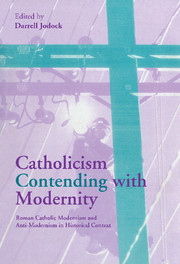 Catholicism Contending with Modernity
Catholicism Contending with Modernity Book contents
- Frontmatter
- Contents
- List of contributors
- Acknowledgments
- List of abbreviations
- Note on the text
- Introduction I: The Modernist crisis
- Introduction II: The Modernists and the anti-Modernists
- PART I THE LATE NINETEENTH-CENTURY SETTING OF MODERNISM AND ANTI-MODERNISM
- PART II MAURICE BLONDEL AND ALFRED LOISY IN FRANCE
- PART III FRIEDRICH VON HÜGEL AND MAUDE PETRE IN ENGLAND
- PART IV SOCIAL MODERNISM AND ANTI-MODERNISM IN FRANCE
- 10 Social modernism: the case of the Semaines sociales
- 11 Anti-Modernism and the elective affinity between politics and philosophy
- Conclusion
- Index
11 - Anti-Modernism and the elective affinity between politics and philosophy
Published online by Cambridge University Press: 30 October 2009
- Frontmatter
- Contents
- List of contributors
- Acknowledgments
- List of abbreviations
- Note on the text
- Introduction I: The Modernist crisis
- Introduction II: The Modernists and the anti-Modernists
- PART I THE LATE NINETEENTH-CENTURY SETTING OF MODERNISM AND ANTI-MODERNISM
- PART II MAURICE BLONDEL AND ALFRED LOISY IN FRANCE
- PART III FRIEDRICH VON HÜGEL AND MAUDE PETRE IN ENGLAND
- PART IV SOCIAL MODERNISM AND ANTI-MODERNISM IN FRANCE
- 10 Social modernism: the case of the Semaines sociales
- 11 Anti-Modernism and the elective affinity between politics and philosophy
- Conclusion
- Index
Summary
INTRODUCTORY COMMENTS
There are two truisms about politics and philosophy. The first is that politics bears upon the totality of philosophy. The second is that philosophy bears upon the totality of politics. However, a person can press either to the point of falsehood and foolishness. For example, one can press the first to the point of claiming that politics will explain the whole of philosophy, or one can press the second to the point of claiming that philosophy will explain the whole of politics. And the closer one comes to pressing either truism to its extreme, the closer one comes to falsehood and foolishness. The reality of the connection between politics and philosophy is, in fact, extremely complex. My objective in the present article is to show just how complex the connection can be by tracing the work of two major Catholic philosophers of the twentieth century, Reginald Garrigou-Lagrange and Jacques Maritain. I select them in particular because of their interest and my interest in the Modernist controversy within the Roman Catholic Church at the beginning of the century and because in their lives politics and philosophy affected each other throughout a long and significant personal relationship. When I say that my objective is “to show just how complex the connection can be,” I have in mind showing both the extent of the variety and the degree of the complexity.
- Type
- Chapter
- Information
- Catholicism Contending with ModernityRoman Catholic Modernism and Anti-Modernism in Historical Context, pp. 308 - 336Publisher: Cambridge University PressPrint publication year: 2000
- 1
- Cited by
